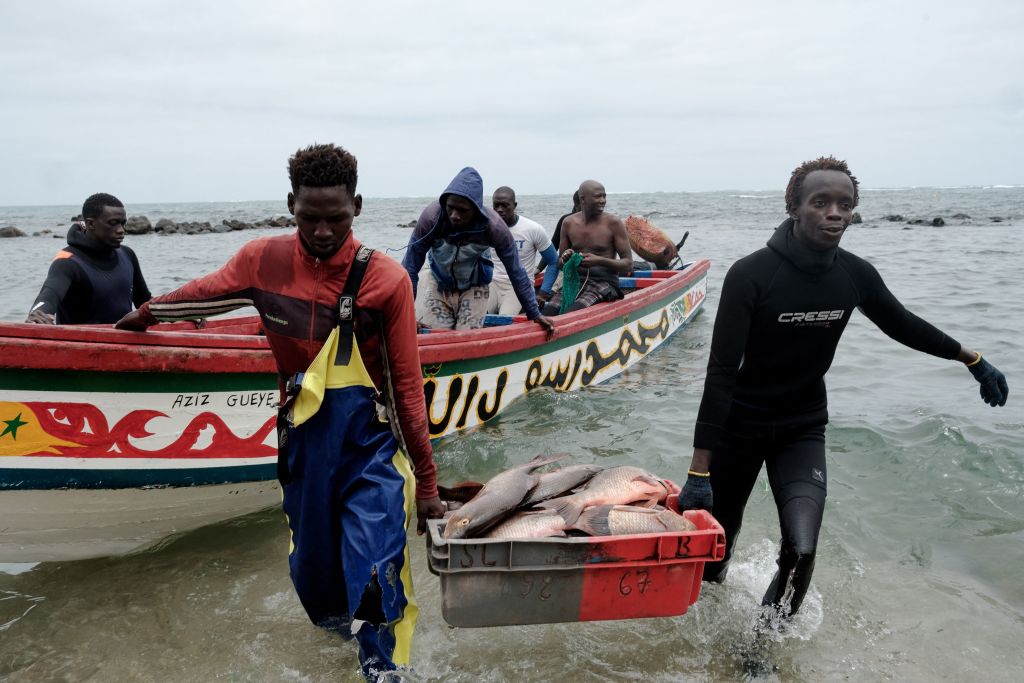ADF STAFF
People across Senegal have enjoyed thieboudienne, the national dish, since at least the 19th century. Made with stuffed fish, rice, vegetables and a variety of West African spices, the savory dish’s recipe has traveled across Sub-Saharan Africa.
In Senegal, the preferred fish used in thieboudienne is white grouper. But overfishing led by China’s distant-water fishing (DWF) fleet has caused the population of the species to collapse.
Senegalese nutritionist Codou Kébé said grouper’s collapse has led to the loss of a key protein for the nation’s residents. There aren’t many other species left to take grouper’s place, as 90% of the nation’s fisheries are fully fished or facing collapse, according to data compiled by the Environmental Justice Foundation (EJF) and the United Nations.
The lack of fish has caused fish prices to soar.
“The sea no longer supports the weight that is loaded on it, which has made the fish flee,” Kébé told The Associated Press. “This is the work of the boats with their nets, which are numerous in the sea.”
For years, artisanal fishermenw in Senegal have complained of the presence of Chinese industrial trawlers fishing illegally in the nation’s waters.
China is the world’s worst illegal, unreported and unregulated (IUU) fishing offender, according to the IUU Fishing Index. Of the top 10 companies engaged in illegal fishing globally, eight are from China.
Overfishing by China and other nations has been catastrophic in Senegal and around West Africa. About 20% of illegally caught fish worldwide comes from waters near The Gambia, Guinea, Guinea-Bissau, Mauritania, Senegal and Sierra Leone, according to a report by news organization Investigative Journalism Reportika, or Ij-Reportika.
West Africa now is considered the world’s epicenter for IUU fishing, which steals an estimated $2.3 billion to $9.4 billion annually from local governments, according to the Financial Transparency Coalition.
According to the EJF, Senegal loses more than $270 million in revenue each year to illegal fishing.
In 2022, Karim Sall, president of the Fishermen’s Association in Joal, Senegal, took a crew from France 24 news out for a day of fishing on the Gulf of Guinea in his artisanal fishing boat. Sweating under the sun, Sall pulled in his fishing net by hand.
“That’s the second net, there’s no fish,” Sall said. “There were lots of fish around here, but even if we wait an hour, we won’t catch anything. You know, our waters have turned into a liquid desert.”
On shore, Sall stood on a nearly empty beach where a market once sold tons of fish a day.
“Where we’re standing now there wouldn’t be space to sit or even stand because of how much fish there was,” Sall said. “Look now, the ships aren’t full. The stocks have dropped. That’s because of commercial overfishing.”
On the day they spent with Sall, the news crew filmed three 40-meter-long foreign industrial trawlers fishing in areas reserved for small-scale fishermen. Using huge nets that scrape the ocean floor, indiscriminately catching all manner of marine life, the trawlers can quickly catch 30 times more fish than an artisanal canoe.
At least one of them was a Senegal-flagged vessel that was registered in China. Chinese trawlers are notorious for “flagging in” to African nations, meaning they use and abuse local rules to flag a foreign-owned and -operated fishing vessel into an African registry to fish in local waters. Flagging in is a common sign that vessels engage in illegal fishing.
“If we see a trawler fishing illegally and we report the vessel, Senegalese authorities could take up to 48 hours to respond,” local fisherman Mor Mbengue said. “The authorities say they aren’t allowing any new canoes to come into service while they’re giving licenses to these trawlers, Chinese vessels, in Senegal.”
Mystified and angry, Mbengue turned his palms upward and scowled.

